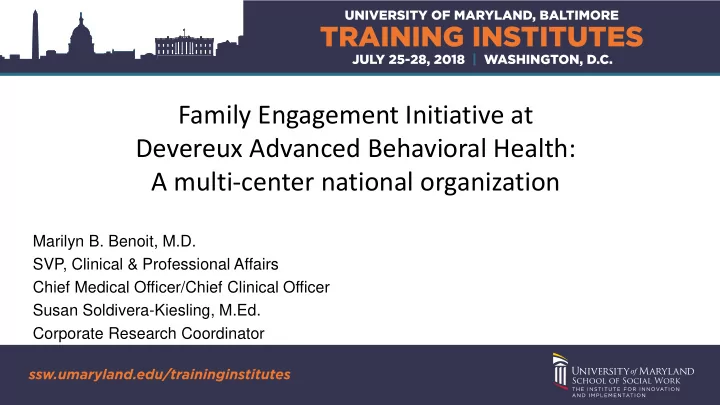

Family Engagement Initiative at Devereux Advanced Behavioral Health: A multi-center national organization Marilyn B. Benoit, M.D. SVP, Clinical & Professional Affairs Chief Medical Officer/Chief Clinical Officer Susan Soldivera-Kiesling, M.Ed. Corporate Research Coordinator
About Devereux Advanced Behavioral Health Founded in 1912 by Helena Devereux, a Philadelphia school teacher who was concerned that the “slow” children were not being taught. Miss Devereux borrowed $500.00 to acquire a home in suburban Philadelphia in Devon and started her first “residential” home.
HELENA DEVEREUX Miss Devereux and Staff
1915 - Line of students – Stone & Gables
Adolescent girls’ classroom circa 1920
Children’s classroom circa 1920
Girls jumping rope circa 1920
Tea party on the lawn, circa 1920
Girls dancing on the lawn, circa 1920
Boys working on our farm, circa 1930
Young men’s typing class circa 1930
L ittle girls’ tea party circa 1920
1921 – Hall Grounds – student luncheon
“Families are the primary source of care and support for the majority of adults and children with mental problems or disorders. Efforts to promote mental health for racial and ethnic minorities must include strategies to strengthen families to function at their fullest potential and to mitigate the stressful effects of caring for a relative with a mental illness or a serious emotional disturbance. ” David Satcher, M.D., Surgeon General Mental Health Report 2000 US Department of Health & Human Services
GOALS To improve and enhance family and individual experience with Devereux To increase Direct Care Staff & Clinicians’ knowledge and understanding of the family experience To ensure individual and family quality of life and treatment success, both long and short-term To prevent recidivism, minimize ongoing use of high intensity services, reduce need for additional services, and implement least restrictive services through family involvement and training throughout the continuum of care
Imple Im lementation Process Completed Building Bridges Initiative assessment to identify priorities. Presented findings at organizational retreat in April 2017 to obtain feedback and brainstorm solutions. Presented findings and plan of action to Board of Trustees. Developed and distributed guidelines in 2017 for enhancing communication between individuals and their families with the use of technology to increase family engagement between face-to-face visits.
Implementation Process, Cont’d Designated Family Engagement as focus for Quality Improvement across organization based on C enter’s BBI survey findings. Invited a parent and a youth consultant from FREDLA to speak at the retreat about effective strategies to engage family and youth.
Implementation Process, Cont’d Followed up on Retreat with additional presentation to Clinical Directors on multiple ways to improve communication with families and youth. Developed the “Family Navigator” job description & distributed to all Centers. Conducted family focus groups, “Chat & Chews,” with support from Philadelphia Community Behavioral Health (CBH), with families from our therapeutic foster care, residential, day, and outpatient programs.
Focus Group Themes Improve communication - timely; internally among relevant staff and externally with families Communicate when client demonstrates positive behaviors/accomplishments Provide single point of entry – coordination of care Show greater respect - no parent blaming; recognize the challenges and stresses that parents have endured prior to placing their children in residential or inpatient
Focus Group Themes, Cont. Teach skills to caregivers so they can manage behaviors from an informed position Reduce staff turnover Facilitate doing fun activities with their children Increase support: once/monthly not sufficient Provide discharge/transitioning support: would like extended into the home for post-discharge Offer more open and flexible visitation
Focus Group Themes, Cont. Provide outcome data Continue Parent Resource position Increase safety – issue with open campus in light of national events Provide assistance with transportation
Progress Monitoring Feedback on the status of each Center’s QI Family Engagement Plan was gathered for a report to the Board. Centers were at different stages of implementation, but significant progress was noted. Some examples are as follows: Use of telehealth technology to communicate with families, with provision of iPads to some families Increase in family psycho-education opportunities, e.g. about Behavior Support Plans and FBAs (teaching more skills to caregivers) Dedication of specific family visitation spaces at centers Formation of Family Support Groups, as requested by families Less restrictive visiting hours Offering opportunities for family to engage in fun activities with their youth Provision of transportation to facilitate visitation
Progress Monitoring, g, Cont. Created Family Engagement training video with family that offered to give constructive feedback on services and experiences with Devereux Video will be deployed across the organization
Recommendations Identify opportunities for improvement that would be easy to implement (“low - hanging fruit”), and provide follow-up to families regarding Devereux’s response to their feedback. Continue “Chat & Chews” across the organization. Distribute local Family and Youth Support organizations information to Centers and encourage them to reach out to their local chapters for external support.
Recommendations, Cont’d. Encourage Centers to create a Family Navigator and/or Peer Support Specialist position and provide training. Pilot Peer Support Position at one program. Seek grant funding for pilot and training. Gather findings from Centers’ Family Engagement QI Outcome Studies and support Centers in implementing next steps. Continue efforts to establish a Youth Peer Support element to our treatment planning.
Family Engagement is is a Forever In Init itiative It is extremely important to stress that this initiative is not a time limited one. It goes on forever and should be continuously adapted to meet the evolving needs of families we serve.
Ackn knowledgements ts Vernick Smith Cooley, M.S. Ashley Gadarowski, M.S. Lea Anne Gardner, Ph.D., RN Amy Kelly, MBA Susan Soldivera Kiesling, M.Ed. Michael Moleski, M.S., BCBA Wanda Newton, M.S. Megan Russell-Currie, Ph.D.
Questions?
Recommend
More recommend